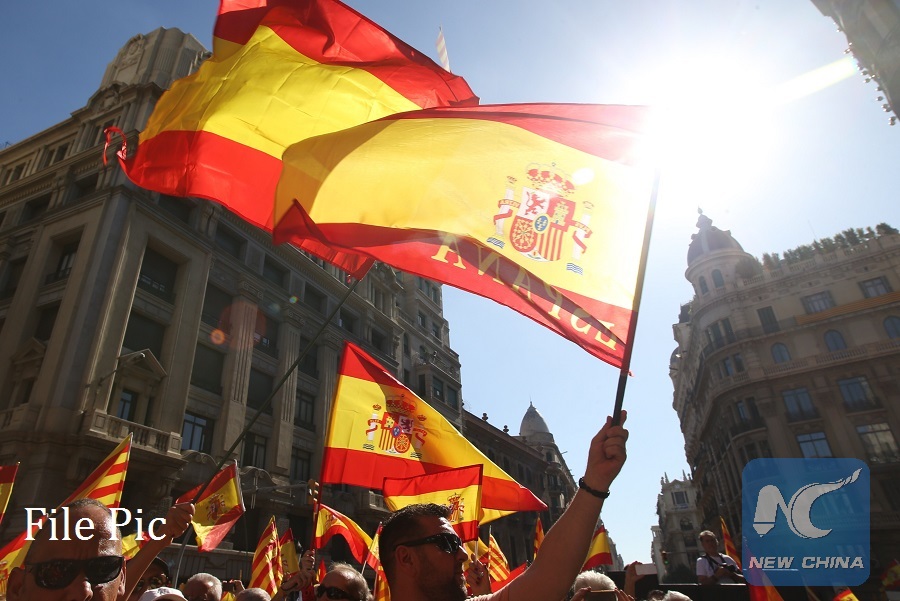
People wave Spanish national flags in a march with the slogan "Enough and let's recover the sensibility", to defend the Spanish constitution and the unity of Spain in Barcelona, Spain, Oct. 8, 2017. (Xinhua/Juan Carlos Rojas)
BARCELONA, Spain, Nov. 3 (Xinhua) -- A wild roller-coaster ride hijacking almost half of Catalans has ground to a halt, as Madrid cut the Gordian knot by invoking article 155 of the Spanish Constitution and imposed direct rule on the once-autonomous region.
All the signs are that Madrid's takeover, entering its first week, has been running smoothly and has won ovation among a broad swath of Barcelonans.
In the meantime, with deposed Catalan leader Carles Puigdement fleeing to Brussels, and some of his cohorts being summoned to Spanish court for charges including "rebellion, sedition, and misuse of public funds", Catalan separatists have landed in hot water.
"The central government's takeover, aimed at stabilizing the situation and bringing the normal life back, is certainly good," 38-year-old Eueni Gegeni Prat, an editor at a truck business website, told Xinhua.
"The separatists' thinking is nonsense," Plat quipped, stressing that "independence will not make Catalonia richer, instead it will result in economic calamities".
Since the independence referendum on Oct. 1, uncertainty over Catalonia has already begun to bite.
According to the College of Mercantile Registers of Spain, a total of 1,821 companies left Catalonia to other places in Spain between Oct. 2 and 27.
The region's two main banks, the fourth largest Banc Sabadell and third largest Caixabank, are among the companies, with the former moving its headquarters to Alicante and the latter to Balearic Islands.
"I am a native Catalan, but I have traveled all over Spain and all the world. I think Catalan's nationalists are very narrow-minded, they should open their eyes wider," said Plat.
Even some teenagers in Barcelona have a good grasp of the fallout of independence.
Eric, 16, speaking to Xinhua at Plaza Catalonia in downtown Barcelona, said: "I back staying in Spain; I don't support separatists, because independence will bring bad consequences."
"The central government has no choice but to take over the administration of Catalonia," said the young student, adding, "I think it's right."
Riding roughshod over Spanish Constitution and Prime Minister Mariano Rajoy's repeated dire warnings, Catalonia's separatist regional government went ahead with the independence referendum.
Some 2.2 million out of 5.4 million eligible Catalan voters cast votes in the referendum and 90 percent of them voted for splitting from Spain.
An opinion poll commissioned by Catalan regional authority in July showed that 49.4 percent of Catalans were against independence while 41.1 percent were in favor.
The low turnout of the Oct. 1 referendum indicated that most anti-independence Catalans have given short shrift to the referendum, which from the outset was ruled illegal by Spanish constitutional court.
Despite that, the Catalan parliament on Friday voted for "the formation of a Catalan Republic as an independent and sovereign state with social and democratic rights".
The unilateral declaration of independence was quashed at a gallop by Madrid, which later on the day dissolved the Catalan parliament, deposed Catalan cabinet and called a fresh regional election on Dec. 21.
Former members of the Catalan regional government, including former deputy prime minister Oriol Junqueras, arrived at the Spanish National Court in Madrid on Thursday to face questioning over a misuse of funds and other issues related to the declaration of independence.
Puigdemont was not among them as he opted to remain in Belgium after traveling there from Barcelona on Sunday.
Five former ministers who traveled to Belgium along with Puigdement have also chosen not to return to Spain to face trial.
Puigdemont alleged it was a "political trial," although his lawyer said he would be willing to make his declaration from Belgium, something the prosecution appeared unwilling to accept.
The sacked president is being prosecuted for rebellion as well as sedition and misuse of public funds. He could face up to 30 years in prison if found guilty.
Puigdement's fleeing has caused disappointment among pro-independence activists and has sparked howls of outrage among anti-independence Catalans.
Asked by Xinhua at Plaza Saint Jaume, where the Catalan government is situated, a crop of pro-independence activists admitted that there is little chance to continue the independence bid.
Most of them said they haven't made the decision whether they will cast votes in the snap election called by Spain's central government in Catalonia on Dec. 21.
However, Puigdement said at a press conference at Brussels' press club on Monday that he accepted the snap election.
Catalan independence must be "slowed down" to avoid unrest, said the deposed Catalan president, insisting that he does not want to drag his fellow citizens into a spiral of violence. "We have been forced to adapt our work plan to avoid violence."

